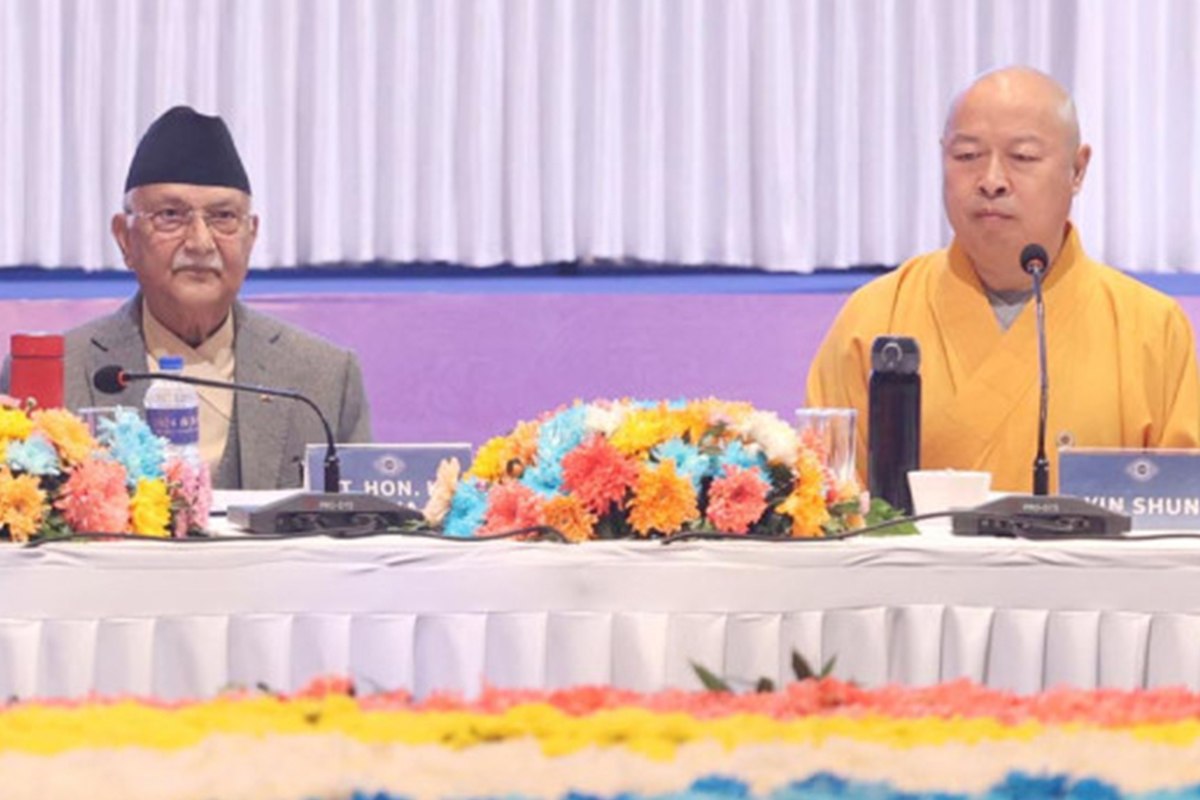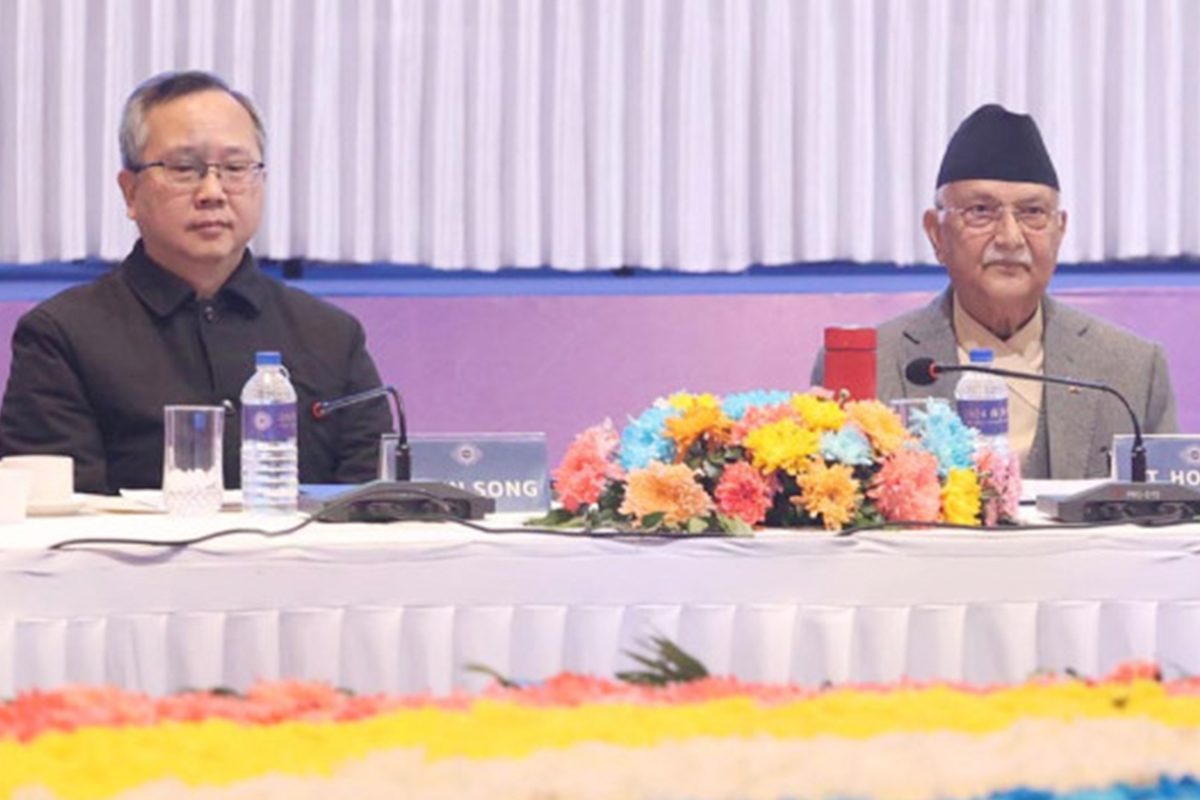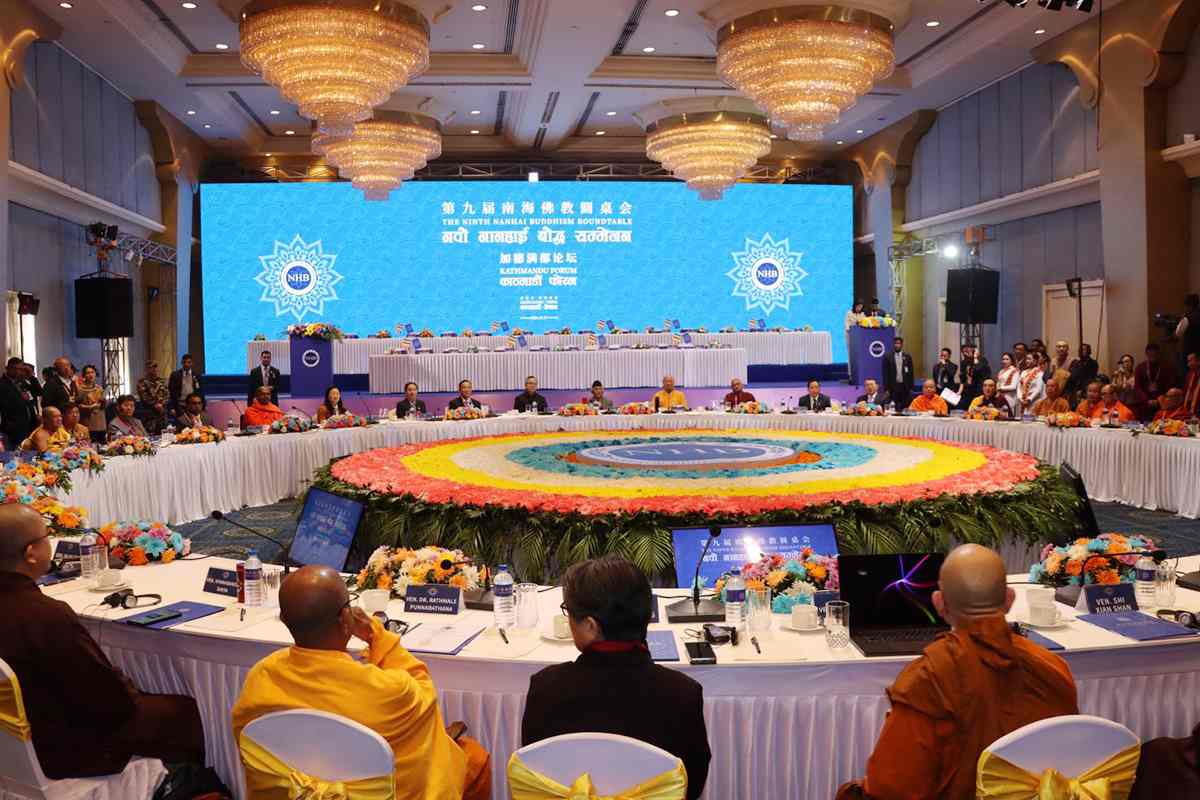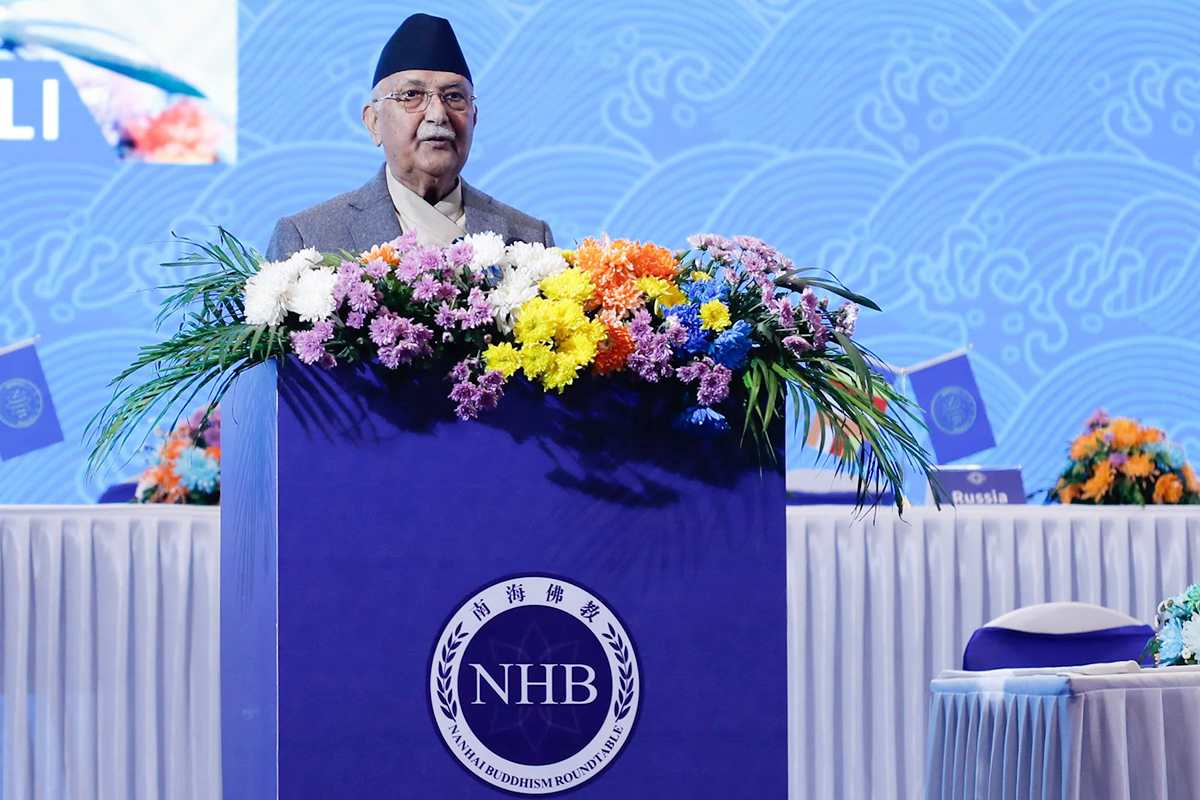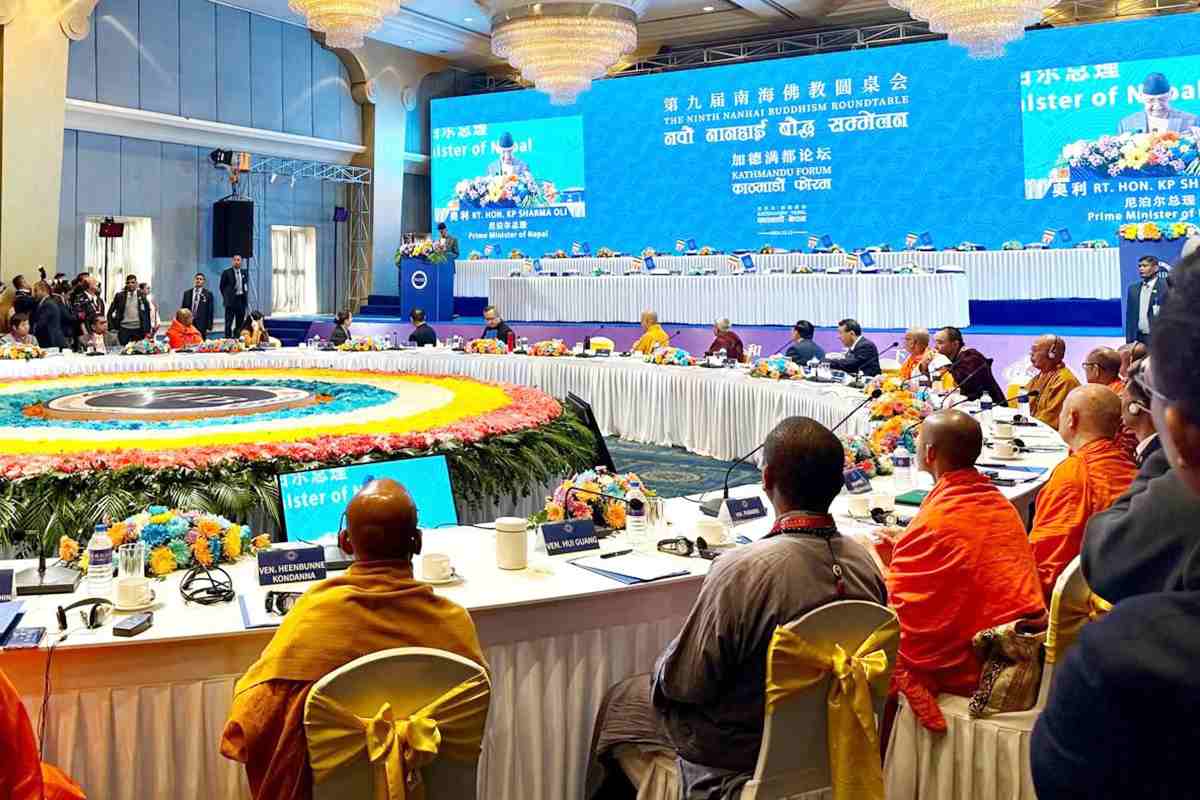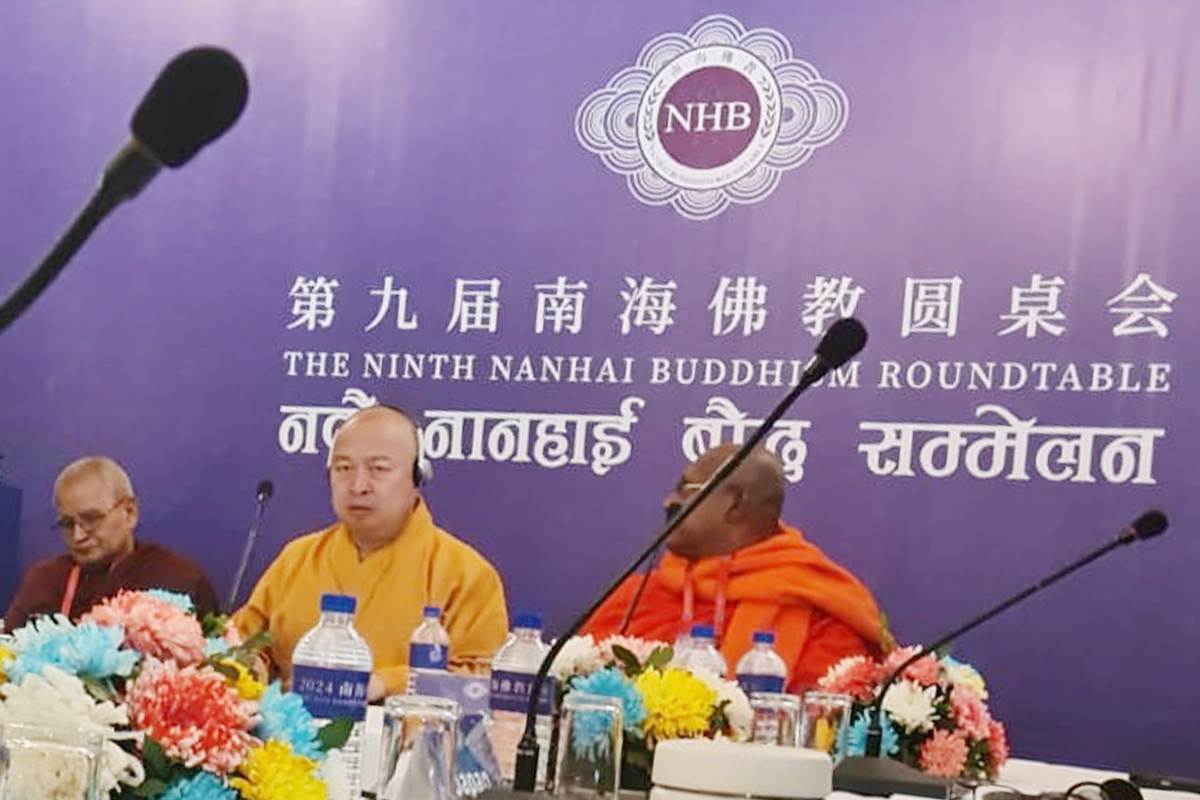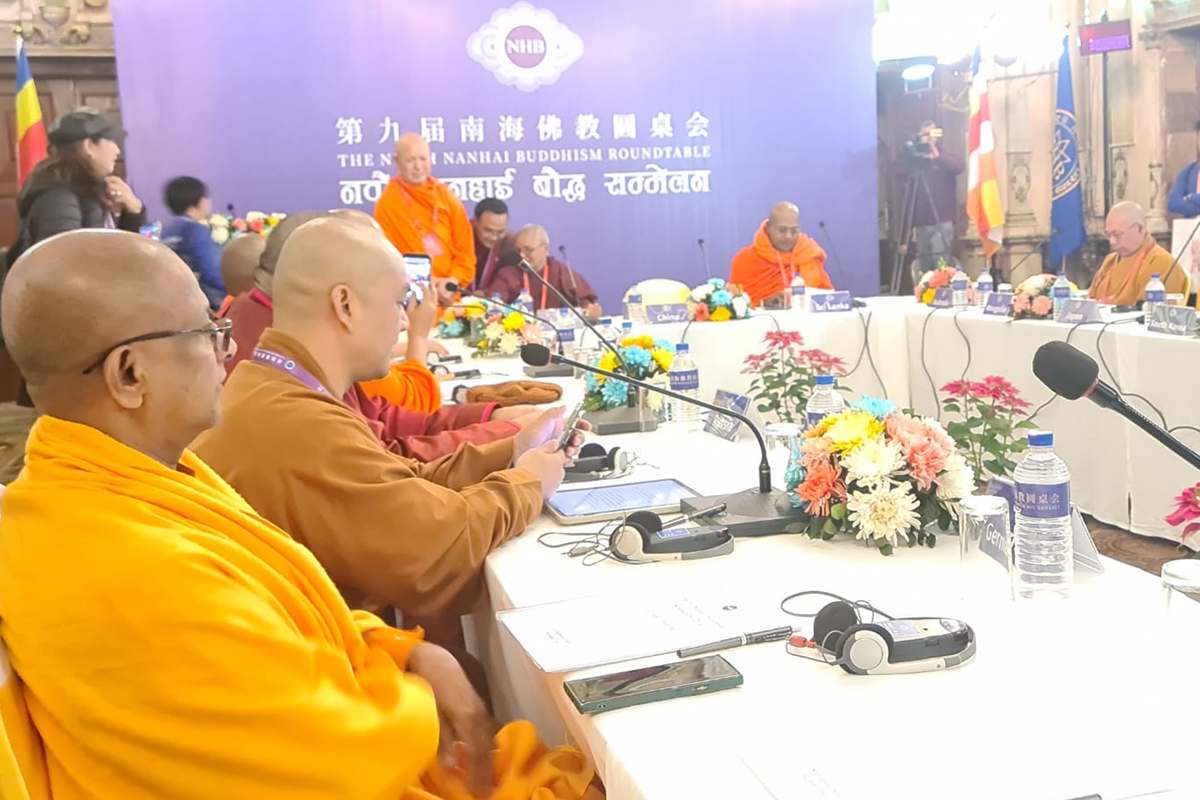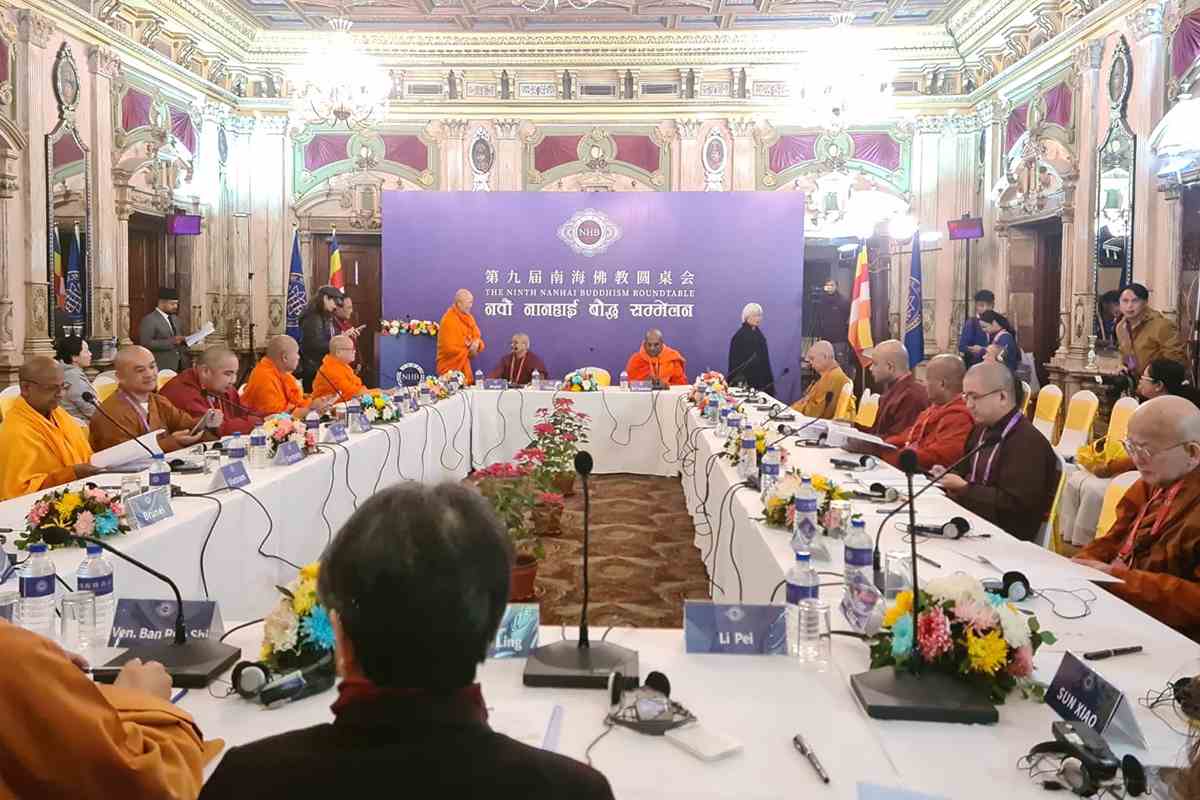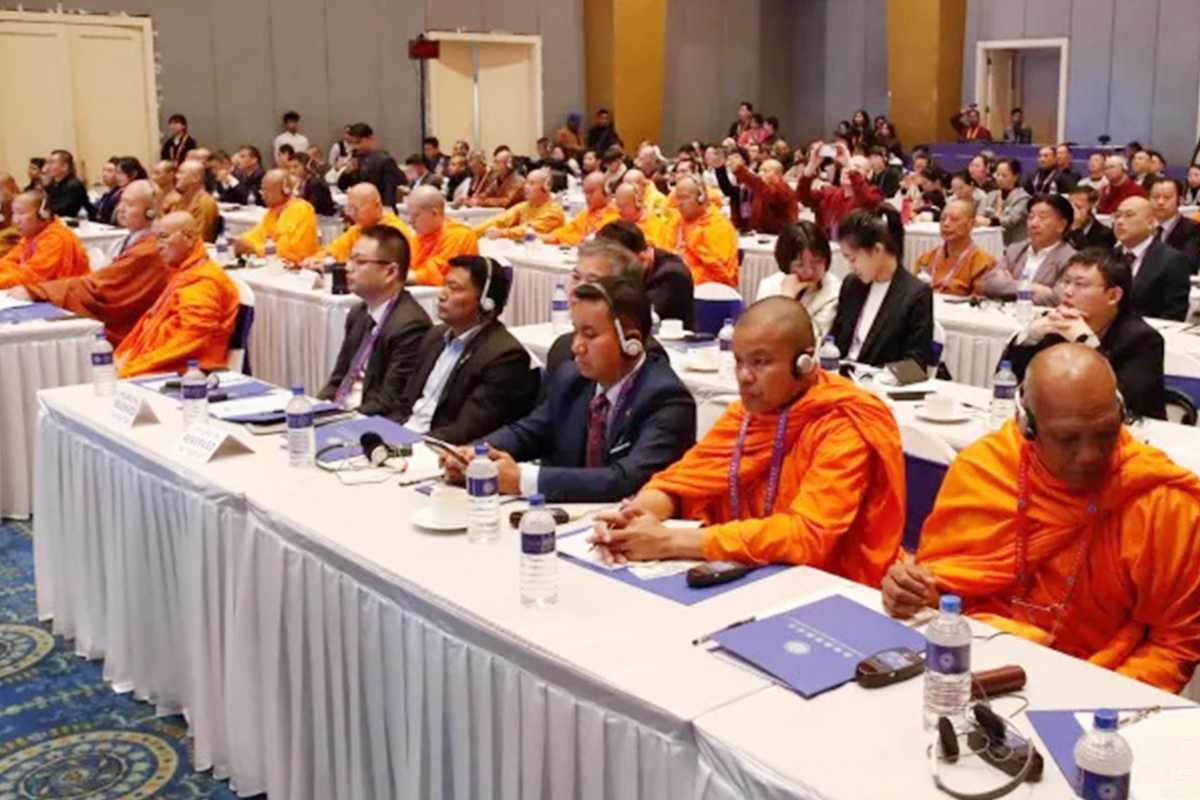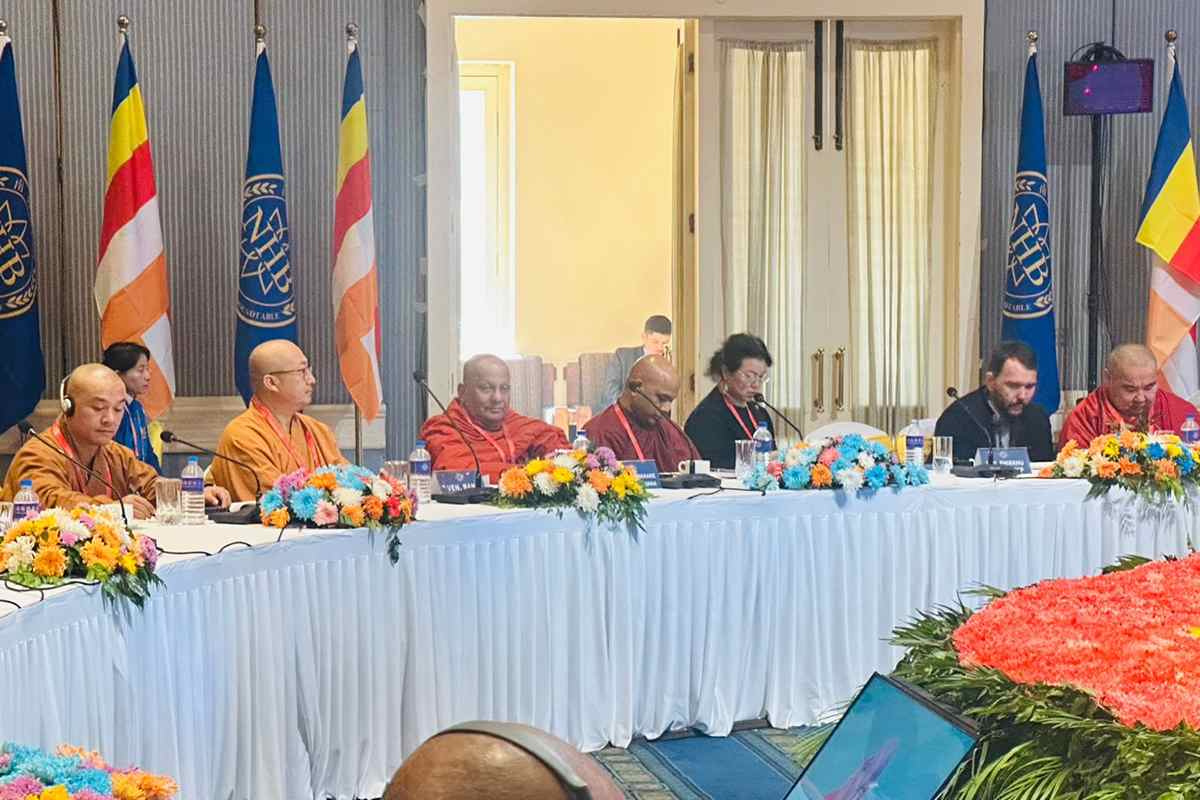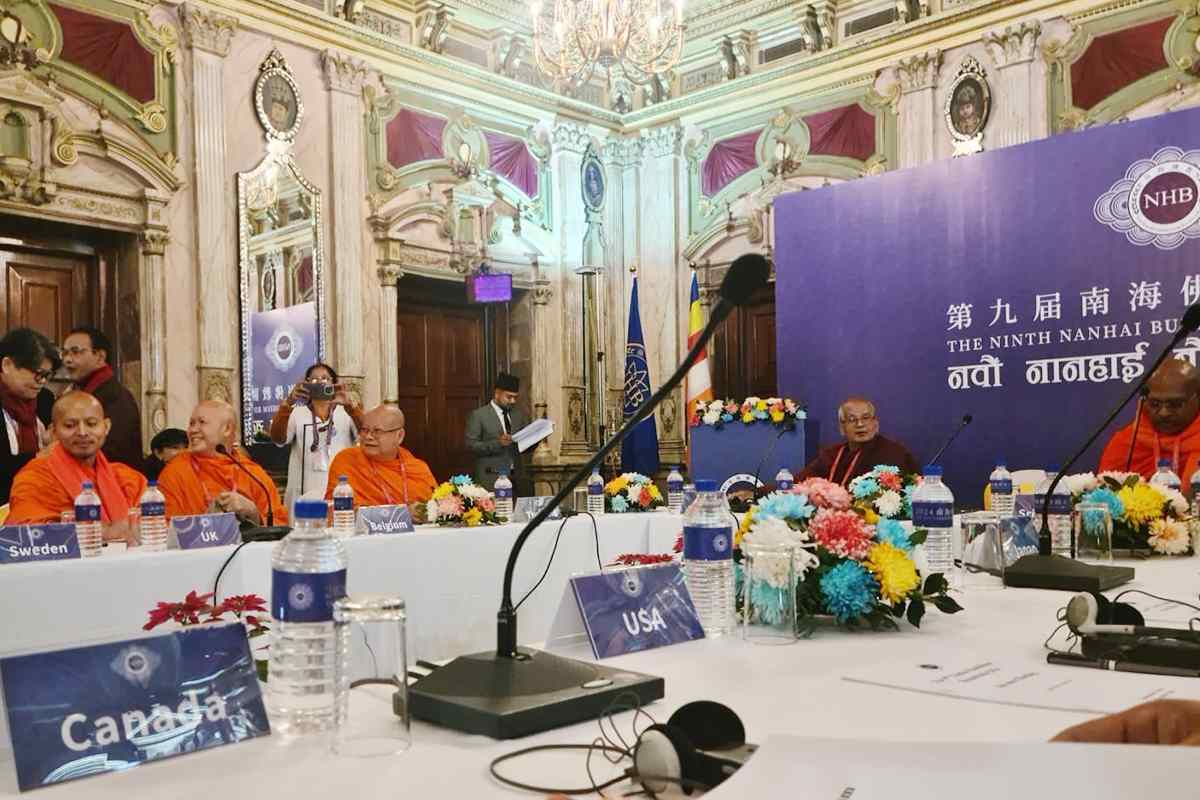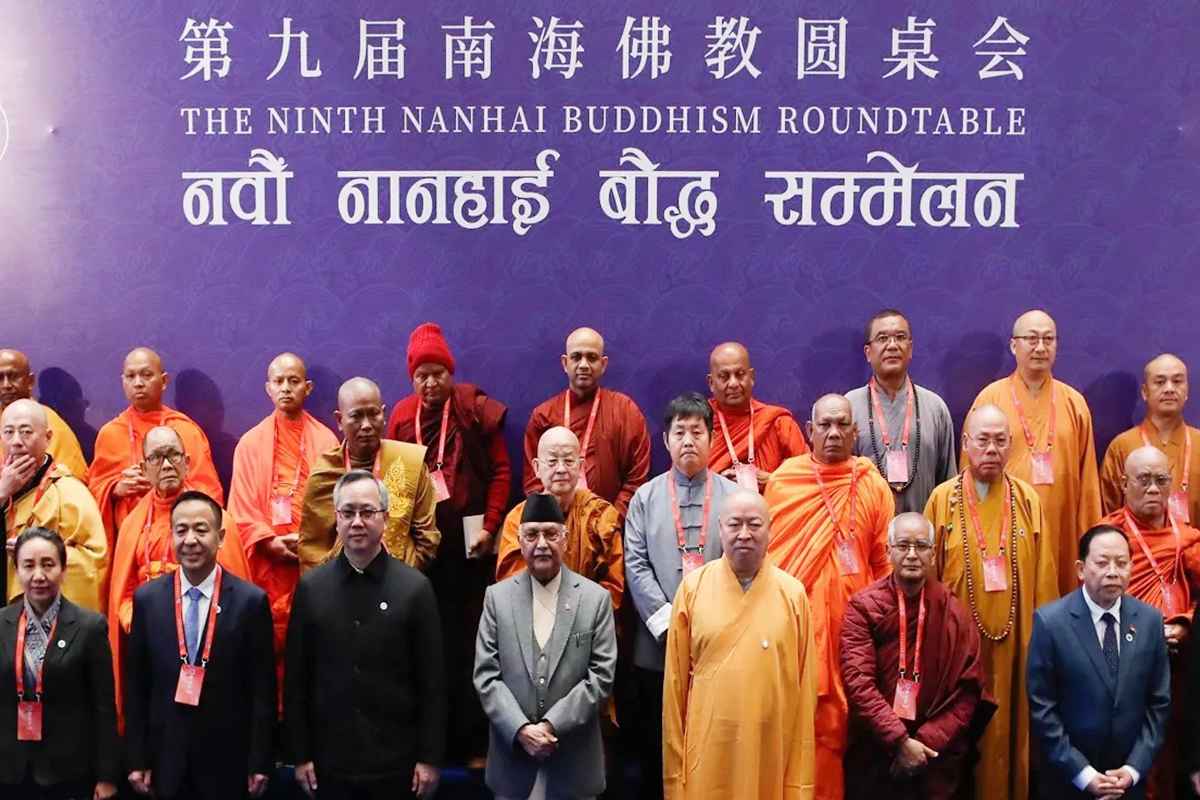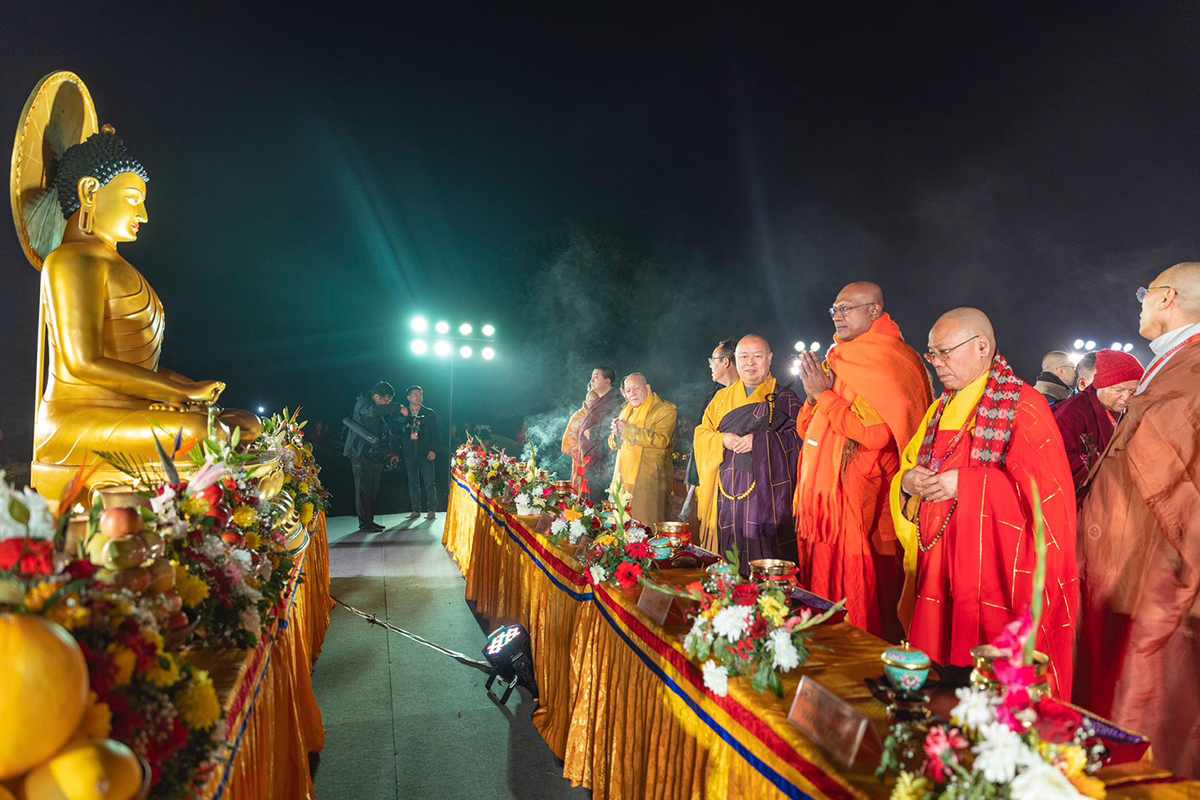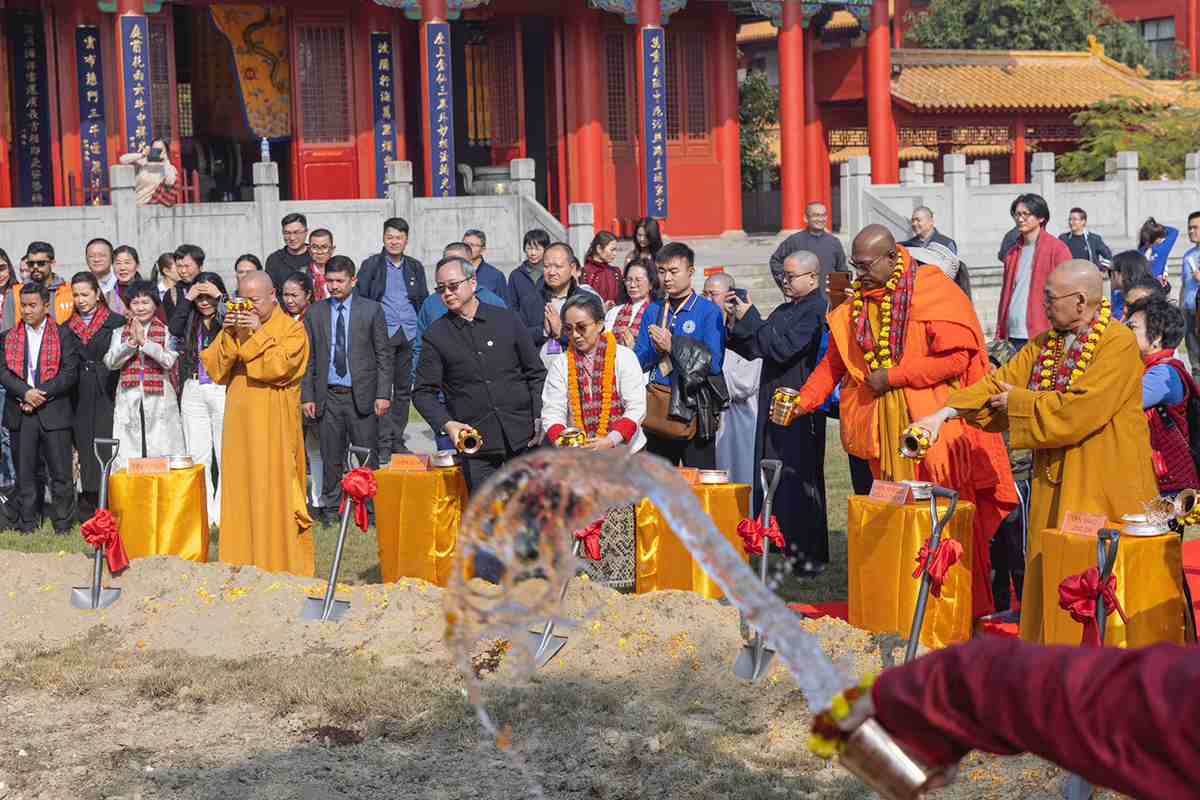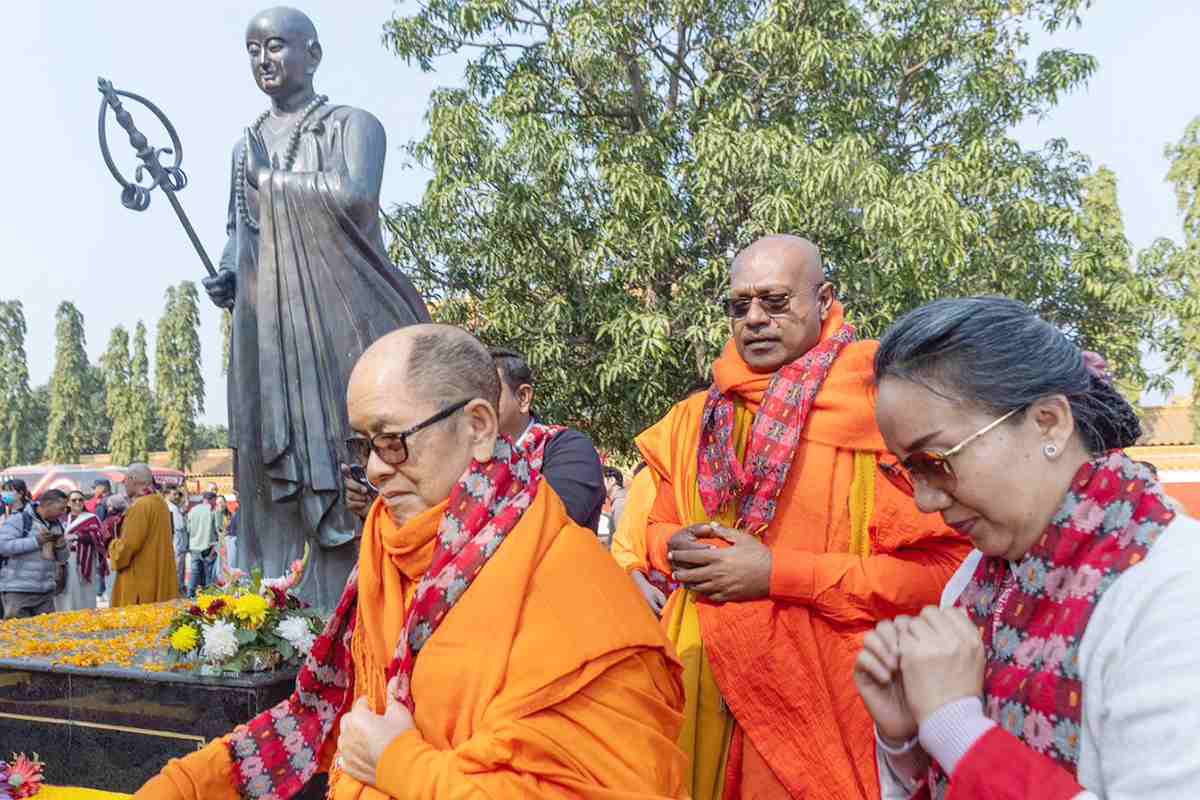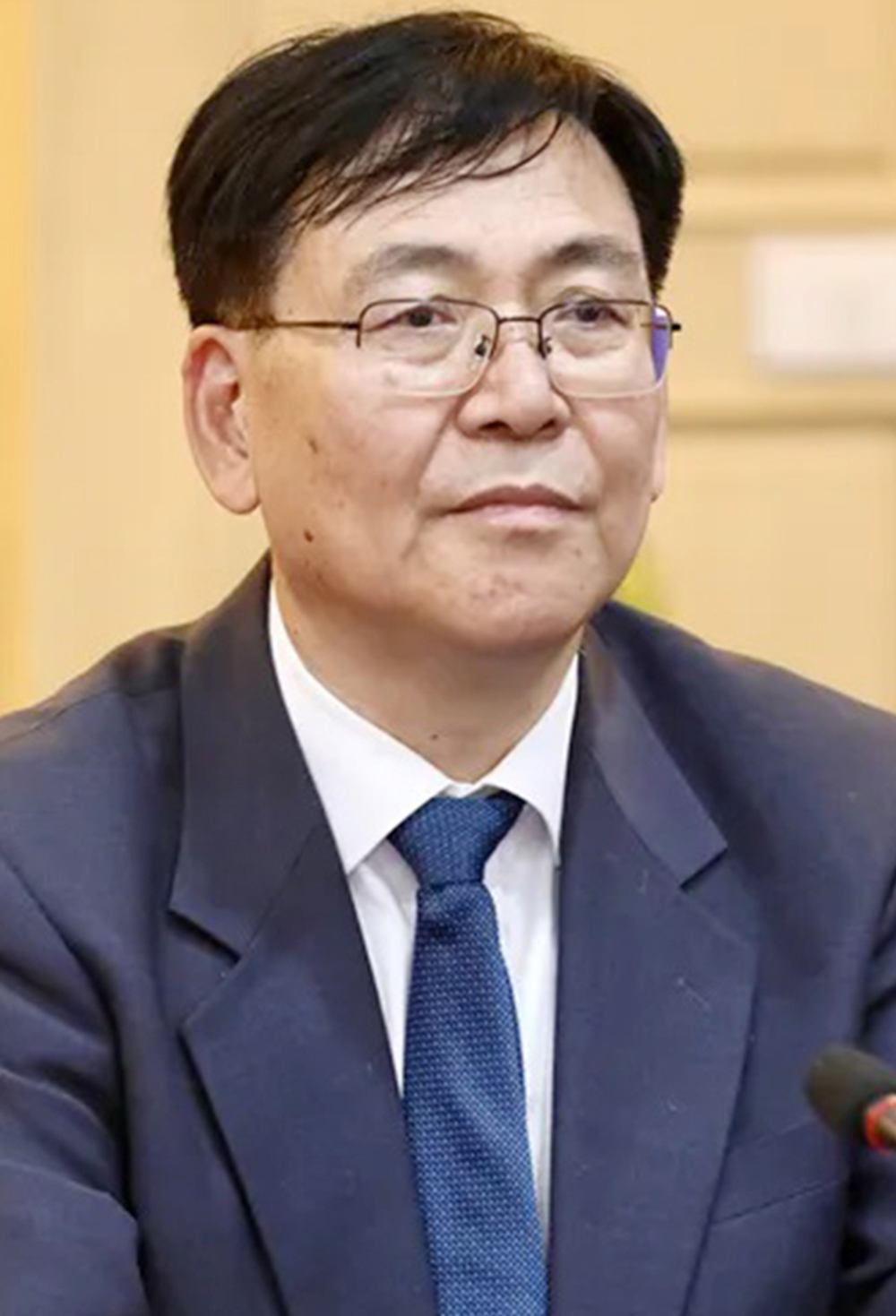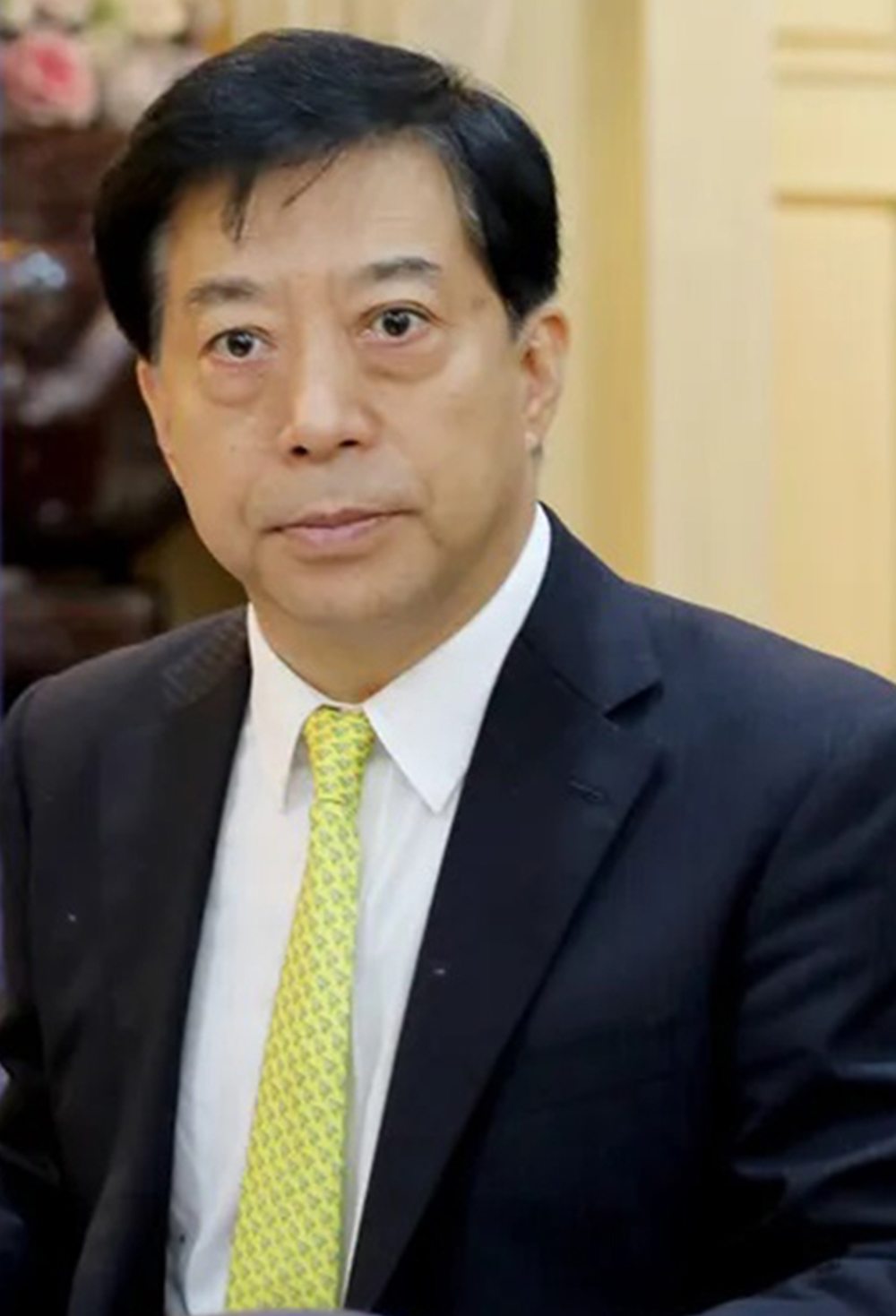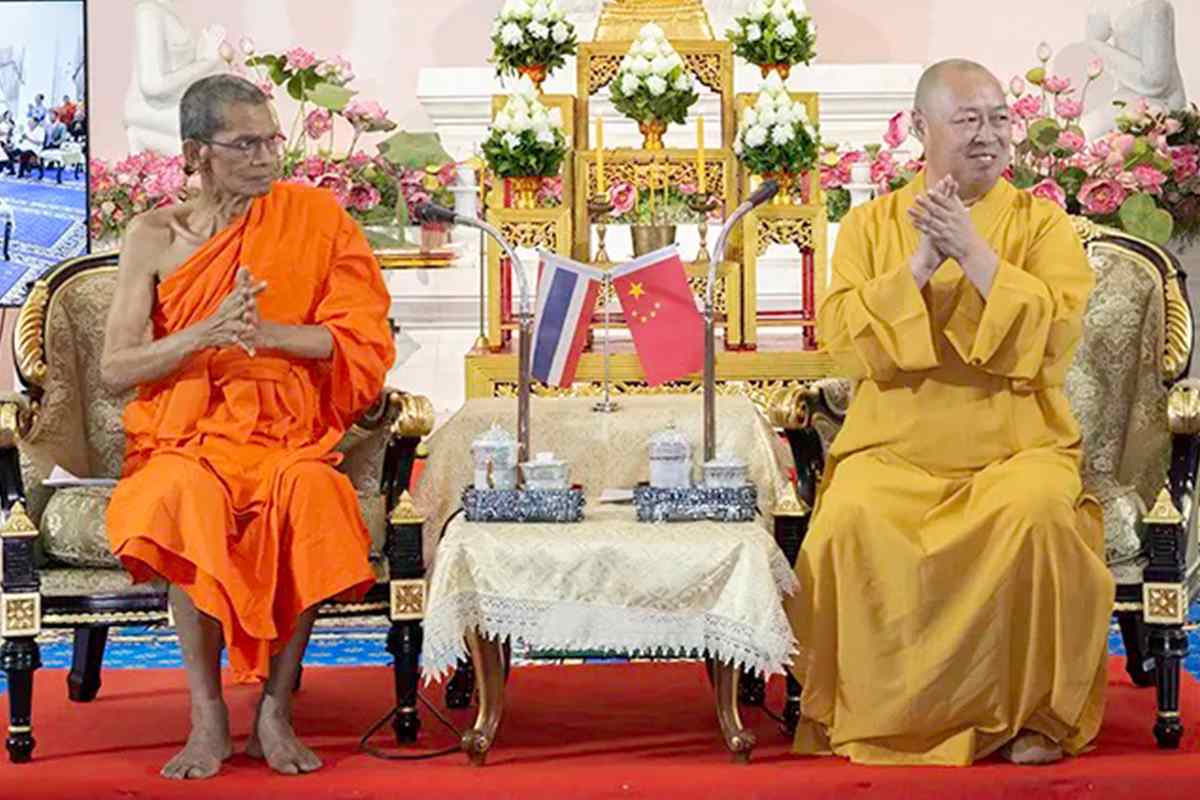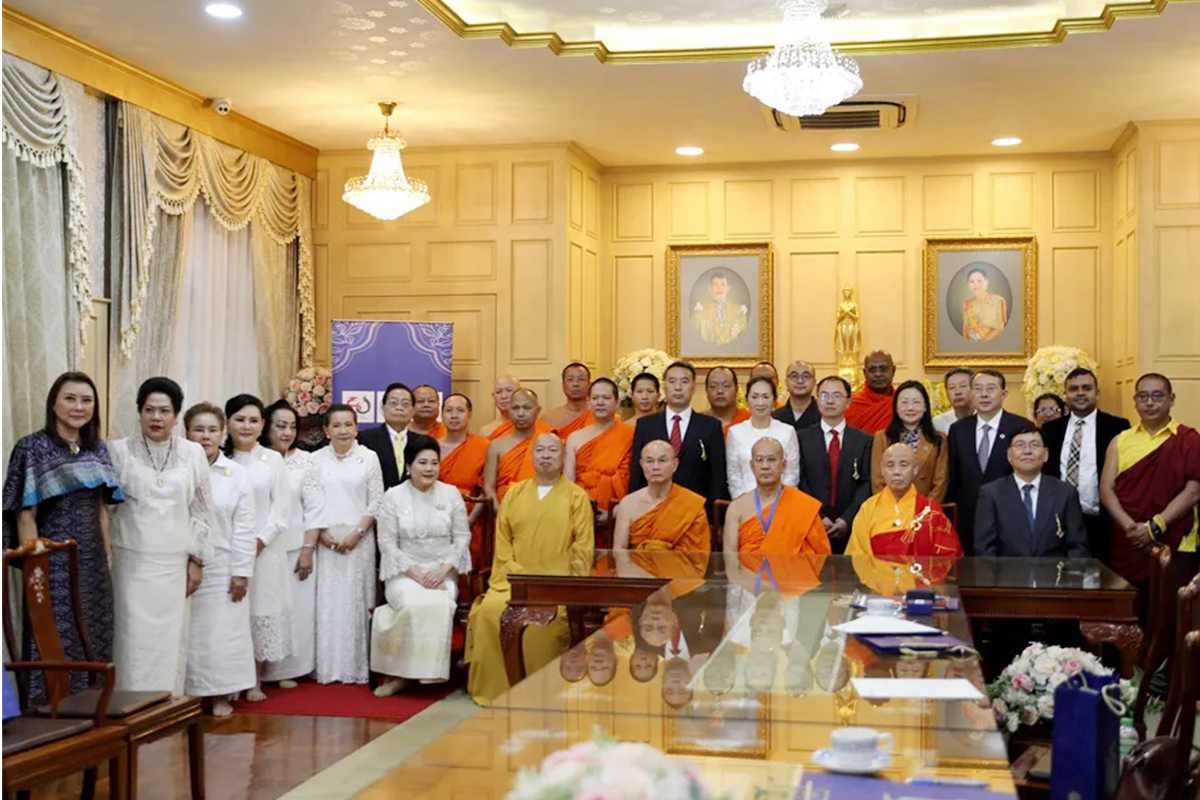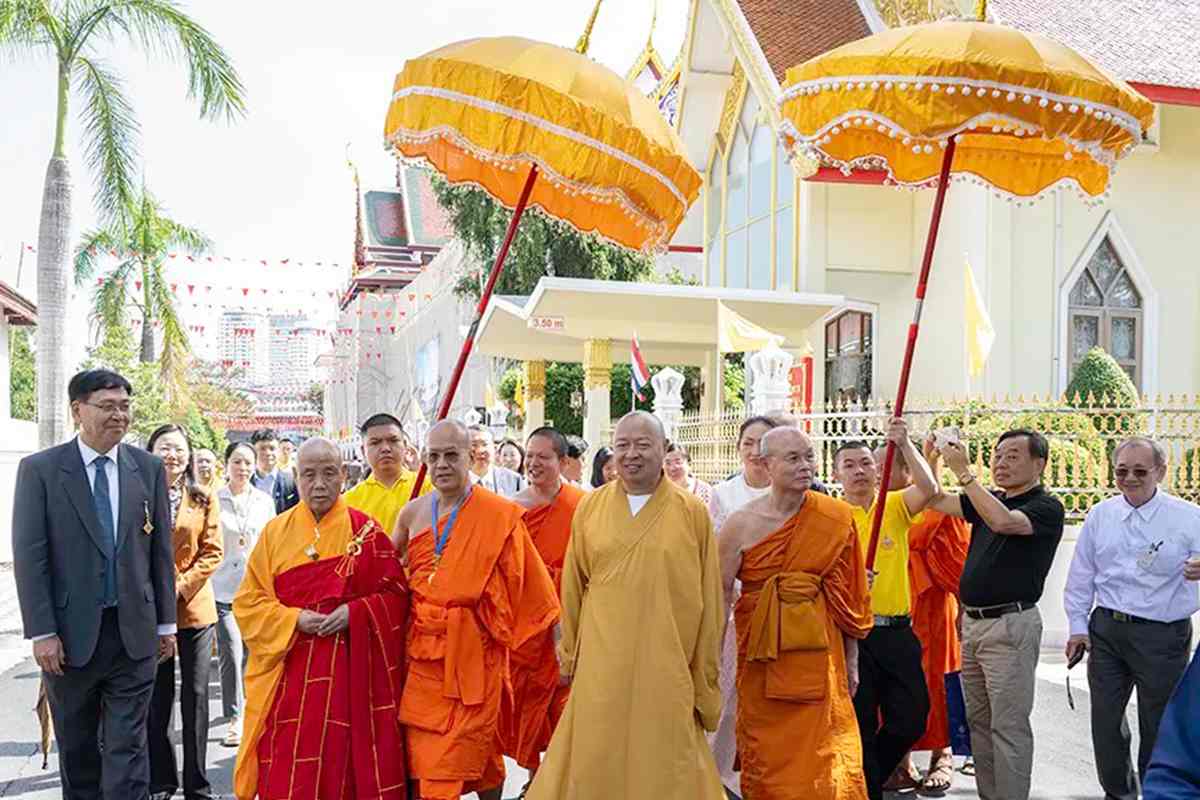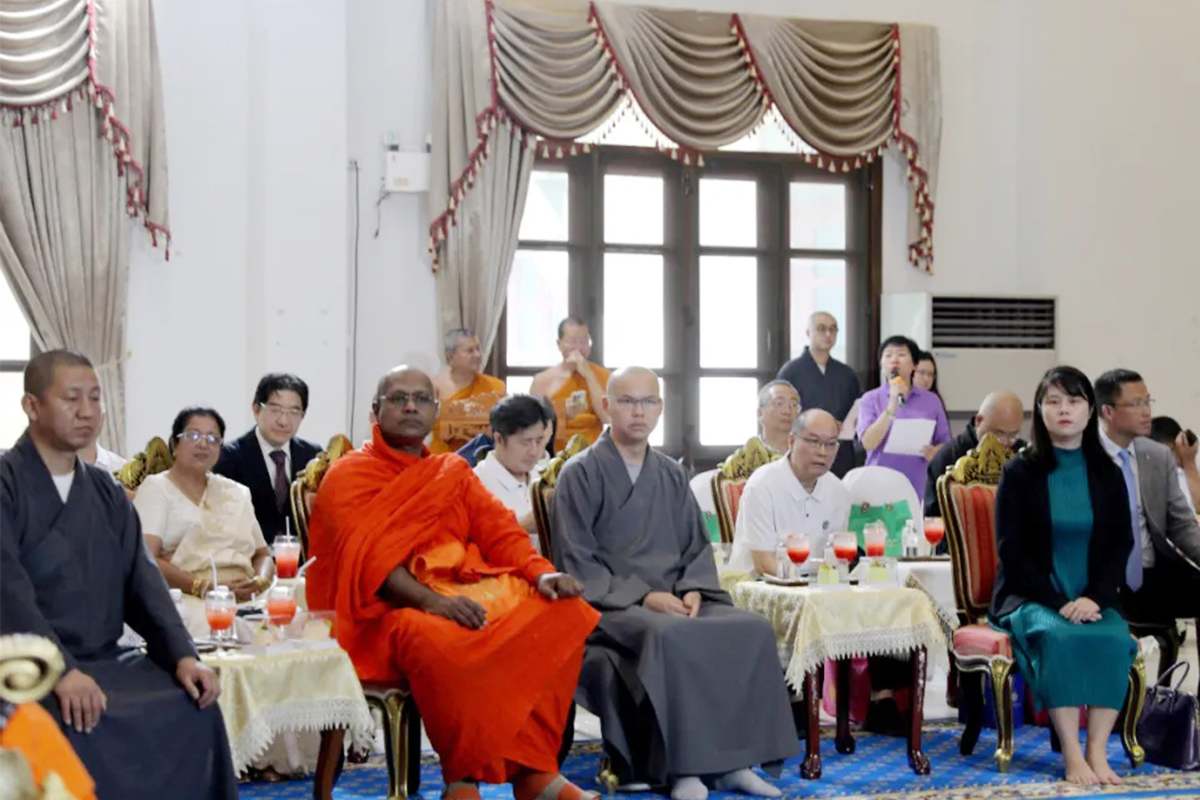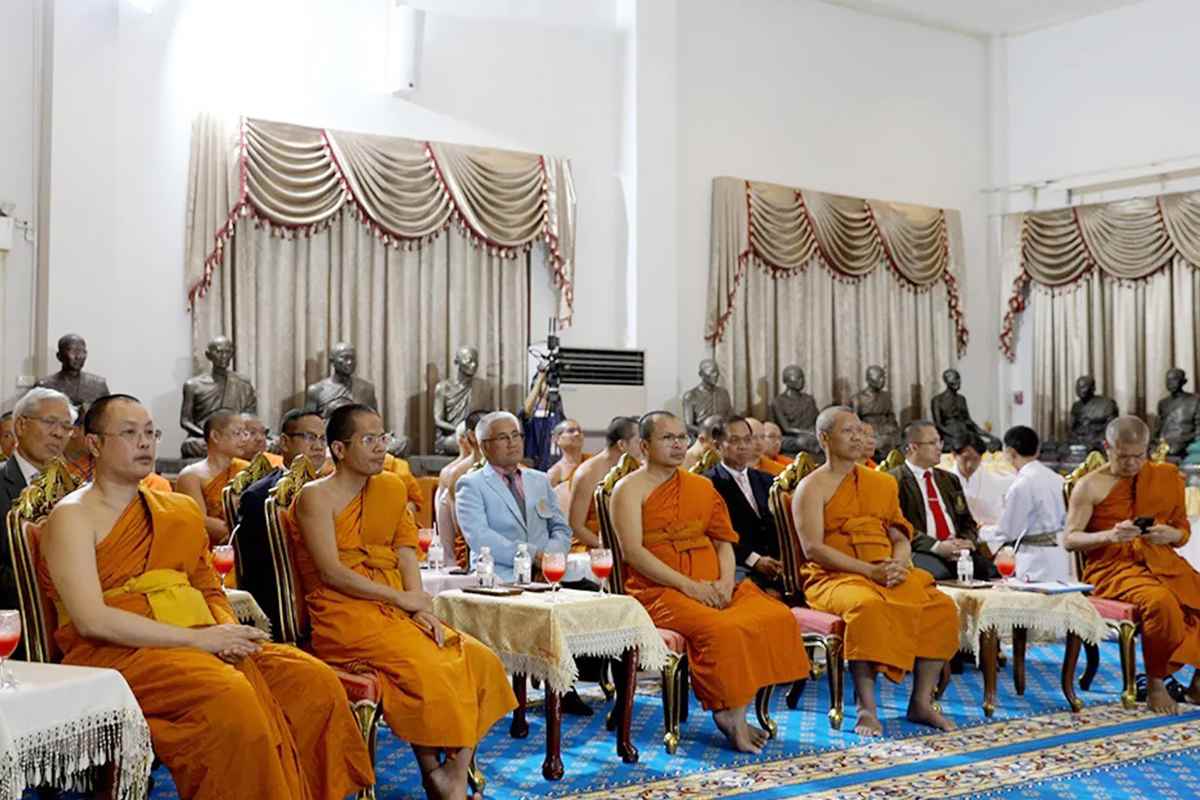Under the theme “Flowing One Dharma & Harmonizing the World,” the 9th Nanhai Buddhism Roundtable Forum was held in Kathmandu, Nepal, from December 12 to 15, 2024. The forum was presided over by the Most Venerable Senior Master Yin Shun, the Vice President of the Buddhist Association of China and Abbot for the Hongfa Temple and the Nanshan Temple in China as well as the Chinese Zhanghua Monastery Lumbini in Nepal. This prestigious gathering brought together over 200 monks, scholars, government officials, and representatives from 28 countries and regions, including China, Nepal, Thailand, India, the United States, Russia, France, Germany, Sri Lanka, Cambodia, Japan, and Vietnam. United by a shared belief in peace and development, participants engaged in meaningful dialogue on fostering global harmony.
In his keynote speech, Most Venerable Senior Master Yin Shun emphasized the significance of this year as the fifth anniversary of Chinese President Xi Jinping’s visit to Nepal, the first year of implementing the Declaration of Mount Xuedou (formulated by the World Buddhist Forum), and the inaugural year of the Joint Statement between China and Nepal. He highlighted the forum’s purpose: to carry forward Buddha’s spirit of compassion, strengthen religious and cultural exchanges between China and Nepal, promote the heritage of Nanhai Buddhism, and contribute to a shared future for humanity through greater mutual understanding and collaboration.
Since its inception in 2016, the South China Sea Buddhism Shenzhen Roundtable has been fostering interfaith and intercultural cooperation. Senior Master Yin Shun has been instrumental in initiating numerous projects to promote Buddhist cultural exchanges across neighboring countries and regions. The event was graced by several dignitaries, including the Honorable K.P. Sharma Oli, Prime Minister of Nepal; His Excellency Chen Song, Chinese Ambassador to Nepal; and Mr. Wang Qiang, President of the Shenzhen Overseas Friendship Association. Each delivered inspiring speeches during the forum’s opening ceremony. In his address as the Chief Guest, Prime Minister K.P. Sharma Oli described Buddhism as a “luminous thread” binding Nepal and China. He remarked:
“Nepal and China share more than just borders; we are bound by the timeless tapestry of history, the majestic embrace of our mountains, the life-giving flow of our rivers, and the profound richness of our cultures. Buddhism has been the luminous thread weaving together the spiritual and cultural fabric of our two nations, fostering an enduring bond of harmony and understanding.” PM Oli reflected on the significance of hosting the forum in Nepal, the sacred birthplace of Gautama Buddha, the Light of Asia. He praised Buddha’s teachings of love, compassion, non-violence, and universal peace, noting that they transcend time and offer guidance to humanity. He added: “The Chaar Arya-Satya (Four Noble Truths) and the Ashtanga-Marga (Eightfold Path) remain timeless principles, liberating us from suffering and guiding us toward enlightenment. In an age marked by materialism and division, Buddha’s wisdom resonates more powerfully, urging us to nurture compassion, embrace peace, and uphold the Pancha Sila (Five Moral Precepts).” PM Oli expressed optimism about the upcoming Youth Forum and World Peace Prayer Ceremony in Lumbini, which aim to inspire younger generations to carry forward Buddha’s luminous legacy. He also acknowledged historical exchanges between Nepal and China, citing examples such as the journeys of Chinese monks Fa Xian and Xuan Zang to Nepal and Nepali scholar Buddhabhadra’s visit to China. Architectural marvels like Nepali-style Buddhist temples in China and the Zhong Hua Chinese Buddhist Monastery in Lumbini stand as enduring symbols of this deep connection. The Prime Minister extended his gratitude to the forum’s organizers for uniting the global Buddhist community to champion harmony and peace.
Many dignitaries sent congratulatory messages through letters and videos. Sinlavong Khoutphaythoune, President of the Central Committee of the Lao Front for National Construction, expressed hope that the forum would be held in Laos in 2025. He praised Venerable Yin Shun as a “contemporary Xuanzang” for his outstanding contributions to international Buddhist cultural exchange. During the forum, participants engaged in thorough discussions on the theme “Flowing One Dharma, Harmonizing the World,” reaching a consensus and jointly signing an initiative to promote the forum’s objectives. On the event’s final day, over 200 devotees from Shenzhen chartered a flight to Gautam Buddha International Airport to participate in the Prayer for World Peace Puja at the China Temple in Lumbini. This marked the second chartered flight organized this year, symbolizing growing collaboration. Preceding the main forum, a launching ceremony and education sub-forum were held on December 6 in Bangkok, Thailand. Additional events, including the Youth Sub-Forum and the Silk Road Light and Charity Journey, were organized during the forum in Nepal.
On December 6, 2024, the 9th Nanhai Buddhist Roundtable officially commenced with a grand launching ceremony held at the Golden Mount Temple (Wat Saket) in Bangkok, Thailand. This marked the beginning of the roundtable’s various activities, centered around fostering international Buddhist exchanges and cooperation. The guest of honor for the 8th Roundtable, Most Venerable Kirinde Asaji, Abbot of Gangarama Temple in Colombo, Sri Lanka, ceremonially handed over the Dharma Cup to the guest of honor for this year’s roundtable, Mahajan Sidhartha, Secretary-General of the Nepalese Bhikkhu Association. This significant handover was facilitated by the Deputy Sangha King of Thailand, Phra Pongmasit, and Most Venerable Senior Master Yin Shun, Vice President of the Buddhist Association of China and Abbot of Shenzhen Hongfa Temple in China and Nepal. The ceremony was attended by a distinguished gathering of international Buddhist leaders, government officials, and scholars. Among them were Chen Ruifeng, Director of the State Administration of Religious Affairs of China. Han Zhiqiang, China’s Ambassador to Thailand. Yan Jue, President of the Buddhist Association of China. Phra Pongmasit, Deputy Supreme Patriarch of Thailand and Abbot of Wat Saket. Mali Saayampong, Minister of Foreign Affairs of Thailand. Phra Pongmasit delivered a warm welcome on behalf of the Thai Buddhist community, emphasizing the significance of the event coinciding with the Thai King’s birthday and the approaching 50th anniversary of China-Thailand diplomatic relations. He highlighted the deep historical ties between Thailand and China, likening their relationship to that of siblings.
Chen Ruifeng congratulated the launch of the roundtable, emphasizing the historical role of Buddhism in fostering cultural exchanges between China and Thailand. He described Buddhism as a “bridge” promoting peace, understanding, and collaboration. Han Zhiqiang lauded the roundtable as a platform not only for Buddhist dialogue but also for enhancing cultural exchanges and fostering peace in the South China Sea region. He underscored the symbolic importance of enshrining the Buddha’s tooth relic from Lingguang Temple in Thailand, reflecting the strong Buddhist connection between the two nations. Yan Jue highlighted the achievements of the South China Sea Buddhist Roundtable, praising it as a vital platform for Buddhist exchange and cooperation, which has significantly strengthened relationships among South China Sea countries. Most Venerable Senior Master Yin Shun, initiator and convener of the roundtable, delivered an inspiring keynote speech. Reflecting on 13 years of collaboration between China and Thailand, he noted the historical significance of the Buddha’s relic being enshrined in Thailand, coinciding with the Thai King’s birthday. He expressed hope for everlasting Buddhist friendship between the two nations and reaffirmed the roundtable’s mission to advance Buddhist cultural exchanges. In the morning, Chinese representatives attending the ceremony visited the iconic Wat Saket, guided by Phra Pongmasit. They engaged in discussions on Sino-Thai Buddhist cultural exchanges and climbed the temple’s revered stupa.
In the afternoon, the Education Forum, a key segment of the roundtable, was held at Mahachulalongkorn University in Bangkok. Over 20 experts and scholars from China and Thailand exchanged insights on contemporary Buddhist education and the interactions between Northern and Southern Buddhism. The forum explored the theme: “Looking at the Past to Understand the Present, Returning to the Roots to Create New Possibilities.” Founded in 2016, the South China Sea Buddhist Roundtable has grown into a premier platform for Buddhist collaboration, promoting regional peace and development. The initiative aligns with the Belt and Road vision, fostering mutual learning and cultural integration across diverse Buddhist traditions, including Han, Tibetan, and Southern Buddhism. Over the years, the roundtable has introduced impactful initiatives such as the “Charity Light Walk,” mutual Buddhist scripture translation projects, and youth development programs. These efforts have received widespread acclaim and significantly strengthened ties among countries in the South China Sea region. The main forum of this year’s roundtable, themed “Common Source of Dharma, Harmony in the World,” will take place in Kathmandu, Nepal, on December 13, 2024. Other key events, including the Youth Forum, the Silk Road Light and Love Walk, and the World Peace Prayer Ceremony, will also be held concurrently in Nepal, further advancing the roundtable’s mission of fostering peace, understanding, and cooperation.
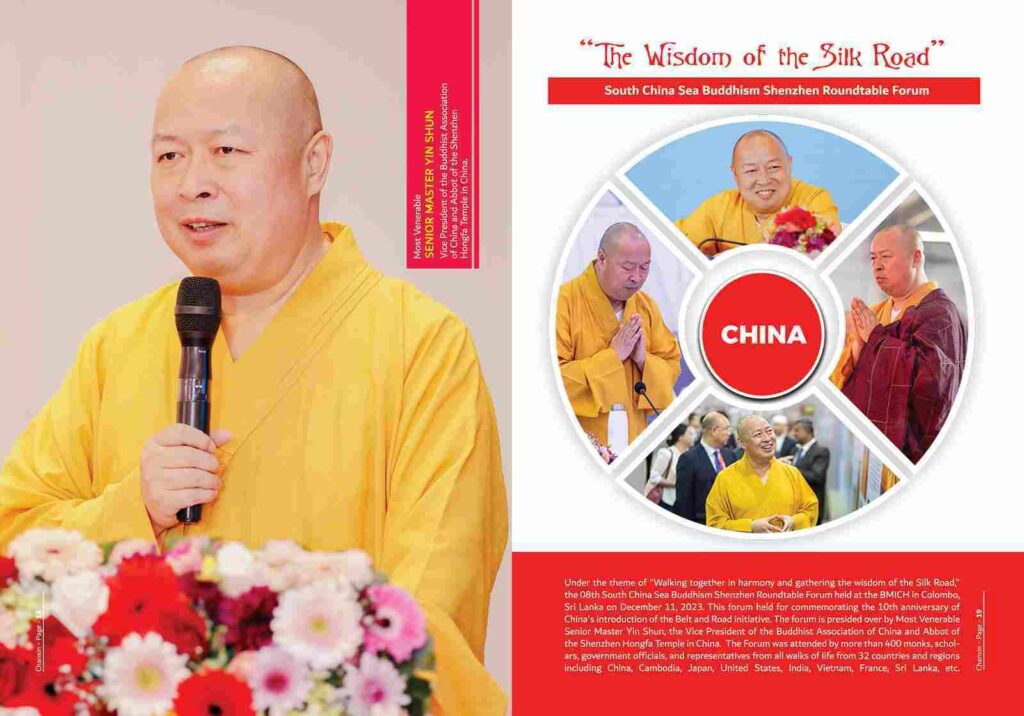
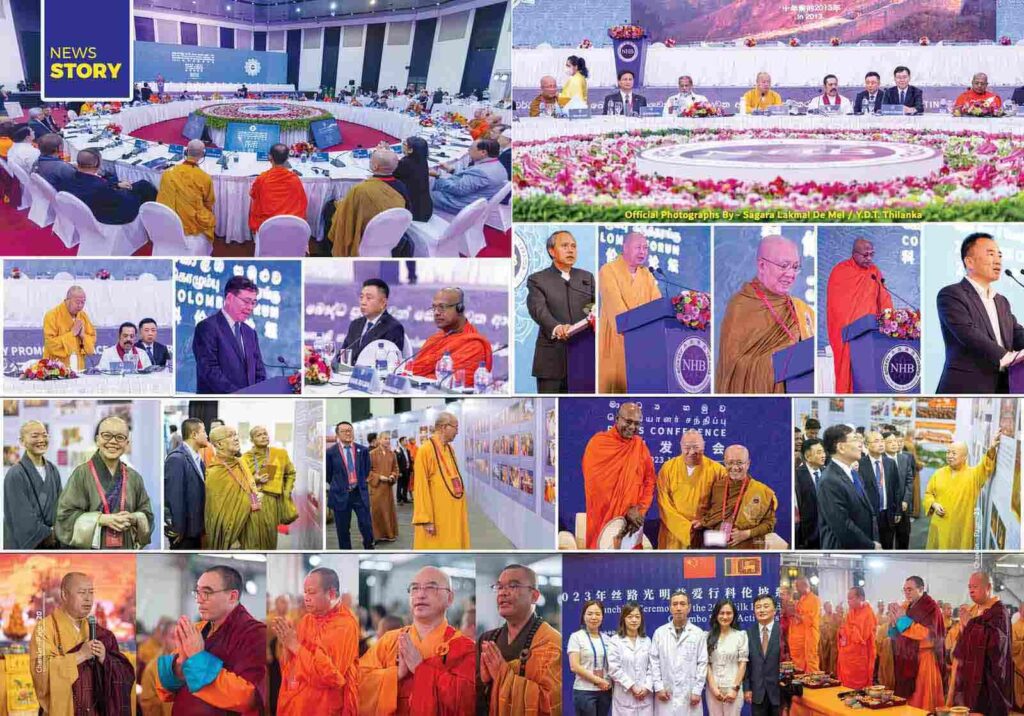
Most Venerable Parawahera Chandarathana Thero, the Chief Sangha Nayaka in France, Head of the SECSA Foundation & President of International Buddhist Center, Paris, France delivered special speech at the forum. “It is an honor to be invited to participate in the main forum of the Nanhai Buddhism Roundtable to discuss the theme of “From the same source, harmony brings peace to the world” with Buddhist leaders, scholars and officials from all over the world. I would like to express my gratitude to the initiator, Grand Master Yin Shun, and the organizers of the Roundtable for providing such an important platform for the global Buddhist community, as well as to the government and people of Nepal, the birthplace of the Buddha, for the warm hospitality they have extended to us. Since the attainment of Buddha’s enlightenment, Buddhism has always been centered on the core concepts of compassion, wisdom and harmony, despite the fact that different sects have been formed due to cultural and geographical differences. The French International Buddhist Center continues to explore how these common spiritual dimensions can serve contemporary society through the practice of breath meditation and inner practice. We connect different sects through physical, mental and spiritual paths, demonstrating the spirituality of Buddhism’s “from the same source”.
As one of the major dissemination organizations of Buddhism in France and Europe, we are committed to promoting dialogue and cooperation between Northern, Theravada and other Buddhist traditions. Such cross-cultural and inter-denominational interactions not only strengthen the foundation of Buddhism’s roots in Europe in the context of globalization, but also provide opportunities for mutual learning and appreciation among the world’s different traditions. For example, our Center introduces the Theravada tradition’s method of Inner Vision in its meditation practice, while at the same time linking Buddhist concepts to modern mental health and common human well-being by taking into account the needs and cultural contexts of European societies. The Buddhist values of harmony and coexistence are in harmony with the goal of building a community of human destiny. At the French International Buddhist Center, we not only promote individual practice through meditation courses, but also promote the overall well-being of society through community service and charitable activities, reflecting the social responsibility of Buddhism. We believe that this combination of “internal practice and external promotion” can contribute wisdom to global peace and sustainable development. Over the past few years, the French International Buddhist Center has actively participated in international Buddhist forums and academic exchanges, emphasizing the promotion of mutual understanding among different sects through cross-cultural dialogue. For example, our experience in organizing international Buddhist symposiums and establishing cooperative relationships with Buddhist organizations in several countries proves that cultural exchange is indeed a bridge to enhance trust and achieve common goals.
As a center based on the Theravada tradition, we have accumulated great experience in spreading the practices of breathing meditation and internal observance. These practices not only provide spiritual support to local believers in France, but also contribute to a better understanding of the core teachings of Buddhism among people of different cultural backgrounds through international training programs. Through these experiences, we can better inform the international propagation of Buddhism in other regions. On behalf of the French International Buddhist Center, I would like to express my heartfelt respect to the Nanhai Buddhism Roundtable and its founder, Grand Master Yin Shun. Thanks to this platform, the global Buddhist community has an opportunity to share wisdom and move forward together. We are deeply grateful to the Nanhai Buddhism Roundtable for its contribution to the unity and development of Buddhism in the world. Looking ahead, we look forward to deeper cooperation with the Nanhai Buddhism Roundtable and our global Buddhist partners in strengthening the sharing of experiences in teaching meditation and mindfulness, promoting cross-denominational academic dialogues and cultural exchanges, as well as exploring innovative solutions for Buddhism in addressing global issues. We believe that Buddhism, with its rich wisdom and compassionate spirit, will provide significant support to humanity in creating a more harmonious future. Once again, I would like to express my gratitude to the organizers and contractors for their careful arrangements, and to everyone here for their concern and support for the heritage and development of Buddhist culture. May the Dharma always shine, and the world be in harmony! May you be well and happy!
很荣幸能受邀参与南海佛教圆桌会主论坛,与在座来自世界各地的佛教领袖、学者和官员共同探讨“法乳同源、和合共生”这一主题。感谢发起人印顺大和尚及圆桌会主办方为全球佛教界提供这样一个重要平台,也感谢佛陀诞生地尼泊尔的政府和人民给予我们的热情款待。 佛教自佛陀成道以来,尽管因文化与地域的差异而形成了不同的宗派,但始终以慈悲、智慧和和合为核心理念。法国国际佛教中心通过实践呼吸冥想和内观修行,不断探索这些共同的精神内涵如何为当代社会服务。我们以身心修养和精神提升的途径连接不同宗派,展现佛教“法乳同源”的精神实质。 作为法国及欧洲佛教的重要传播机构之一,我们致力于促进北传佛教、上座部佛教及其他佛教传统之间的对话与合作。在全球化的今天,这种跨文化、跨宗派的互动不仅加强了佛教在欧洲的扎根,也为世界不同传统提供了互学互鉴的机会。例如,中心在冥想修行中引入上座部传统的内观方法,同时结合欧洲社会的需求和文化背景,将佛教理念与现代心理健康及人类共同福祉联系起来。
佛教提倡和谐与共生的价值观正与构建人类命运共同体的目标相契合。在法国国际佛教中心,我们不仅通过冥想课程推广个体修行,还通过社区服务与慈善活动,促进社会的整体福祉,体现了佛教的社会责任。我们相信,这种“内修与外弘”结合的方式,能够为全球的和平与可持续发展贡献智慧。 在过去的几年中,法国国际佛教中心积极参与国际佛教论坛与学术交流,强调通过跨文化对话促进不同宗派间的相互理解。例如,我们举办国际佛教研讨会,与多个国家的佛教组织建立合作关系,这些经验证明,文化交流是增进信任、实现共同目标的桥梁。作为以上座部传统为基础的中心,我们在传播呼吸冥想与内观修行方面积累了丰富经验。这些修行方法不仅为法国本地信众提供了精神支持,也通过国际培训项目,帮助不同文化背景的人们更好地理解佛教的核心教义。这些经验可以为其他地区的佛教国际弘传提供借鉴。 我谨代表法国国际佛教中心,对南海佛教圆桌会及其创立者印顺大和尚表达由衷的敬意。正是在这个平台的推动下,全球佛教界有了一个能够共享智慧、共同前行的契机。我们深深感激南海佛教圆桌会为世界佛教团结与发展所作的贡献。 展望未来,我们期待与南海佛教圆桌会及全球佛教伙伴在以下方面开展更深层次的合作:加强冥想与正念教学经验的共享,推动跨宗派的学术对话与文化交流,以及探索佛教在应对全球性问题中的创新解决方案。我们相信,佛教将以其丰富的智慧与慈悲精神,为人类构建一个更和谐的未来提供重要支持。 再次感谢主办方和承办方的精心安排,以及在座各位对佛教文化传承与发展的关注与支持。 愿佛法常明,世界和谐。
Buddhika Sanjeewa
Founder / Chairman / Chief Editor of Chanxin / Bhikkhunis / Mettavalokanaya Magazines & Websites – Sri Lanka.
After visit to Kathmandu, Nepal





